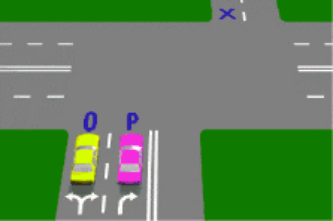Explanation:
To turn left, always utilize the left lane.

Explanation:
The best position is occupied by Vehicle O.
Explanation:
Make sure there is space for you to pass across the crossing without stopping and blocking it.
Explanation:
Only the right-hand lane, or any other lane with a right-pointing arrow, may be used to make a right turn.
Explanation:
Pedestrians must wait for the next green signal before crossing the street.
Explanation:
When turning at an unmarked crossroads, you must yield to oncoming traffic on your right and through traffic.
Explanation:
To turn left, always stay in the left lane.
Explanation:
All the way around, stay in the right lane, then exit in the right lane (if applicable).
Explanation:
When two vehicles are in front of each other, the one turning left has the right of way.
Explanation:
If you want to go straight through an unmarked crossing, you must always give way to vehicles on your right.
Explanation:
You can go straight forward from either lane if the lanes are labeled that way, as long as you stay in the same lane as when you entered the roundabout. Once you've passed the exit before the one you're taking, signal left.
Explanation:
You can go straight forward from either lane if the lanes are labeled that way, as long as you stay in the same lane as when you entered the roundabout. If you're heading straight ahead, don't indicate right.
Explanation:
Signals given by traffic controllers take precedence over those of intersectional signs and lights.
Explanation:
The car will travel through the route of the motorcycle as it exits the roundabout.
Explanation:
You should be prepared to stop if necessary because traffic may appear.
Explanation:
Vehicle R has to yield.
Explanation:
Even if you don't believe there is any risk, you must always stop at a stop sign.
Explanation:
Even if there are arrows on the road or no other cars present, you must always use your indicator when performing a maneuver.
Explanation:
First, come to a complete halt as close to the intersection as practicable.
Explanation:
Vehicle O must yield to all other vehicles.